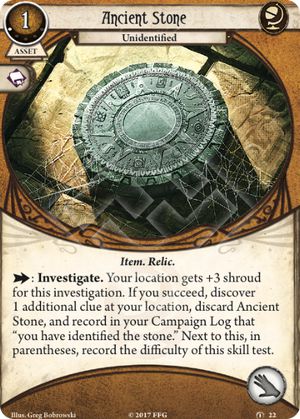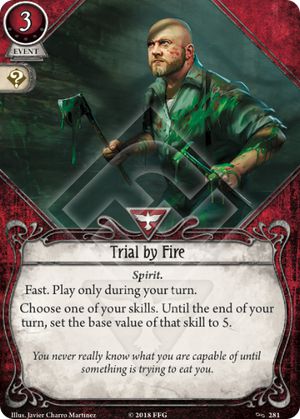
After doing some thinking about this card and weighing the options available, my verdict is that I think this card is actually really bad right now due to lack of good options for this card to recur. Even ignoring the XP cost this card costs 2 resources and an action to put into play, it takes up a hand slot, and once it's actually in play you have to spend an action and place a doom to actually use it. Realistically you're probably going to have to activate this card 3+ times to good effect without causing the Agenda to prematurely advance to justify that up-front cost. Without any kind of doom manipulation, that is not really possible in the majority of scenarios as they're usually 3 Agendas long and the final Agenda usually fails the scenario. Yes, you can run doom manipulation with this, but I'm just trying to establish that this card has a very significant cost to it before getting into why the benefits aren't all that good.
This card seems like a natural fit for primary Mystics, but in actuality I feel like it's pretty underwhelming. The biggest problem by far is that the overwhelming majority of Event Spells either have timing restrictions (Such as Ward of Protection) and thus cannot be recurred or they just plain suck. Astral Travel is already not a good card, but on top of that even in the scenarios where it is actually good you usually only want to play it once. Storm of Spirits is not terrible but it's very situational, there probably aren't going to be a ton of scenarios where you want to play this card a bunch of times. Recharge is generally not played because the drawback for failing severe and fairly likely, forcing you to run cards like Eldritch Inspiration to counteract it. Honestly the best card by far is Moonlight Ritual, but I think it says a lot that the best spell for this card is one that removes its downside. Lastly for Mystics there's Drawn to the Flame which is an actually great card so I can't really complain about that one.
Then there's all the Insight cards which are overwhelmingly Seeker cards. To be fair, there are a lot of really good Seeker Insight cards, but the problem is that most of them are Fast play, which means that unless you're playing Daisy and using your Tome action on this card you're spending an action to play a card usually doesn't use one. And I feel like it goes without saying that spending an action to play a card that's balanced around not taking an action is pretty bad. For cards that stick out to me as being worth it there's "I've got a plan!", which is generally a fairly situational card. Generally speaking you're usually better off trying to find cards that allow you to consistently deal with enemies rather than one-shot effects like this. Cryptic Research and both Preposterous Sketches are not too bad. Deciphered Reality is pretty strong in the right situation and legit might even be worth just dealing with the doom. Knowledge is Power is good for activating the tome's effect without having to use an action or place a doom. Logical Reasoning is very situational, but when it's good it's lifesaving. And No Stone Unturned might be legit worth playing without fastplaying it given that getting any card you want is super powerful. However, the majority of the Insight cards that I think are very good are either not good in mystic decks (or are at least not worth spending Jim or Marie's out-of-class slots on them) or cost XP. (Meaning that only Daisy can take them) And for Daisy, if you really want to recur Insight cards you can just play Eidetic Memory. Eidetic Memory doesn't require 2 resources and an action before you can use its effect, doesn't put doom in play, doesn't require you to use one of Daisy's precious hand slots, copies the speed of the card so you can use it on Shortcut and still have full value, and doesn't require you to use Daisy's tome action to make things fast. Sure you can only do it once, but those advantages are so massive that I feel like I'd pick up 2 copies of Eidetic Memory before getting any of this card.
In summary, I feel like this card's upfront cost, lackluster cardpool on most the investigators that can run it, and having to deal with its doom make it hard to justify running. On Marie I'd rather occupy my handslots with Magnifying Glass and Grotesque Statue plus I'd rather have doom on David Renfield as he gives a boost to Marie's most important stat, on Daisy I feel like Eidetic Memory overshadows it, and in everyone else I feel like their cardpool is too weak at the moment to justify running it. That might change later in The Dream Eaters as I anticipate that they'll print a lot more (hopefully good) spell events due to how they synergize with Luke Robinson but for now I feel like this card is too much effort for not an especially large payoff.



